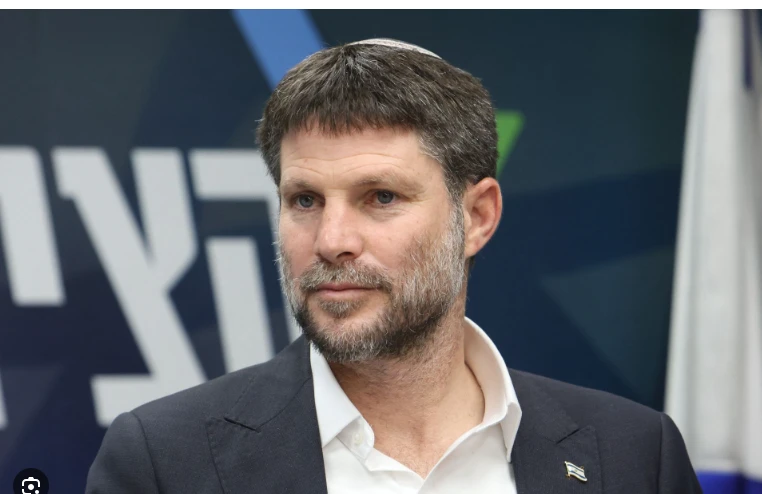Israel minister promises annexation in West Bank in 2025

Stay tuned with 24 News HD Android App

Israel's Finance Minister Bezalel Smotrich pledged on Monday to annex Israeli settlements in the occupied West Bank in 2025, calling Donald Trump's return to power in the United States "an important opportunity".
"The year 2025 will be, with God's help, the year of sovereignty in Judea and Samaria," the far-right minister said, using the biblical name for the West Bank.
Israel has occupied the West Bank since 1967. Palestinians claim the territory as part of a future independent state, and have repeatedly warned that Israeli settlements there are an obstacle to peace.
Smotrich, whose ministerial portfolio also includes some areas of the defence ministry's work, said he had ordered preparations for "applying sovereignty" over Israeli settlements.
Speaking at a meeting in parliament, he said he had "instructed the director of settlement affairs in the defence ministry and the Civil Administration... to prepare the necessary infrastructure for applying sovereignty".
Smotrich congratulated US President-elect Donald Trump on his "incredible and sweeping victory", which the far-right politician said "also brings an important opportunity for the State of Israel".
"During his first term, President Trump led dramatic moves," Smotrich said.
These included recognising Israel's sovereignty over the occupied Golan Heights, breaking with much of the international community by moving the US embassy to Jerusalem, and brokering a set of normalisation deals between Israel and several Arab countries.
Before the normalisation agreements, dubbed the Abraham Accords, the Israeli government had said it would annex large Israeli settlement blocs in the West Bank, before scrapping the plan as the deals were announced.
"We were on the verge of applying sovereignty over the settlements in Judea and Samaria," Smotrich said.
"Now it is time to do it."
He said he would push the government to work together with the new US administration on the matter.
Earlier on Monday, Israel's newly appointed Foreign Minister Gideon Saar said Palestinian statehood was not "realistic", after Palestinian president Mahmud Abbas reiterated his demand for a "sovereign" country.
"I don't think this position is realistic today and we must be realistic," Saar told reporters.
The Palestinian foreign ministry condemned Saar's remarks as an "extension of the war of extermination and displacement against our people".
It also said the comments were in "disregard for international legitimacy... and the international consensus on the two-state solution" to the Israeli-Palestinian conflict.
Excluding east Jerusalem, the West Bank is home to three million Palestinians alongside around 500,000 Israelis living in settlement that are illegal under international law.
Mixed signals over a Lebanon ceasefire
Israeli leaders sent mixed signals on the possibility of a ceasefire with Lebanon on Monday, with Defence Minister Israel Katz seeming to contradict comments by Foreign Minister Gideon Saar.
Saar, who replaced Katz at the foreign ministry this week, told journalists there had been progress towards a ceasefire in Lebanon, where war has raged for more than six weeks as Israel targets Hezbollah.
"There is certain progress," Saar said after being asked about a possible ceasefire. "We are working with the Americans on the issue."
But Katz, who became defence minister this week, told a forum of top military generals that "there will be no ceasefire, and there will be no break in the strikes against Hezbollah".
However, he did add that "if the possibility arises and a good proposal is put forward that would allow us to claim victory... we will certainly consider it very seriously".
Israel escalated air strikes in late September targeting Hezbollah strongholds across Lebanon and sent in ground troops a week later, on September 30.
Prime Minister Benjamin Netanyahu has said the operation's aim is to push Hezbollah north of the Litani River, which flows across southern Lebanon.
Another goal is to stop any attempt by Hezbollah to rearm. The Shiite group is armed and financed by Iran.
Saar on Monday reiterated Israel's objectives.
He said Israel would "be ready" for a ceasefire if Hezbollah does not have a presence on the border and is unable to rearm with weapons systems arriving "from Syria, from the sea, from the airport".
He added: "The main challenge, eventually, will be to enforce what will be agreed."
"We want to get our citizens back home safely, and if we will meet the right conditions, we will be there. In the meantime, the operation of the IDF (Israel Defence Forces) near our border continues," Saar said.
Tens of thousands of Israelis were displaced when Hezbollah began cross-border fire more than a year ago in what it described as support for Palestinian militants Hamas, who attacked Israel on October 7 last year, triggering the ongoing war in Gaza.
